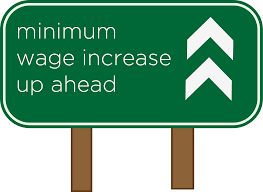Minimum Wage – Requirements & FAQs
Mar 26, 2019
Minimum wage fact sheet for 2019
With the increase of minimum wage on 1 April 2019 you will need to review your employees’ total remuneration packages to ensure you are complying with employment requirements.
From 1 April 2019 the rates are:
Rate |
Adult worker |
Starting-out workers & Trainees |
| Hourly | $17.70 | $14.16 |
| Daily (8 hour day) | $141.60 | $113.28 |
| Weekly (40 hour week) | $708 | $566.40 |
| Fortnightly (80 hour fortnight) | $1,416 | $1,132.80 |
Keep in mind the basis on which you pay your employees, as stated in their employment agreements. This will affect how you work out whether you’re complying with the minimum employment standards. You will need to ensure that you review your employee’s total remuneration package in order to comply with employment requirements.
Below are some frequently asked questions in relation to calculating minimum wage.
Can accommodation and other benefits be counted towards minimum wage?
If you provide accommodation or benefits to your employees, you can agree with them in advance on the value and that you will deduct an agreed amount from their wages as reimbursement. The Wages Protection Act requires that this be in writing. When you’re calculating wages, the Minimum Wage Act allows you to count some of these benefits as ‘wages’, but not all.
Type of benefit |
Count as ‘wages’? |
| Accommodation: | Yes |
| Board and lodging | Unless expressly agreed, the deduction cannot reduce wages by more than 15% of wages calculated at the minimum rate |
| Lodging only | No more than 5% deduction |
| Non-cash benefits e.g. firewood, food, power, phone, transport, wet weather gear |
The MBIE position statement says that these may be counted if the employee has expressly agreed to that. |
If you deduct accommodation from your employee’s pay, make sure:
The amounts agreed upon tally with market rental for similar accommodation in the area.
Total pay, including deductions, is at least equivalent to minimum wage for the hours worked.
KiwiSaver employer contributions and the minimum wage
KiwiSaver employer contributions must be paid in addition to the minimum wage. You are able to agree with employees on a ‘total remuneration’ amount (which includes the amount of KiwiSaver employer contributions), however this will not apply where the amount of wages excluding the KiwiSaver employer contribution works out to be less than the minimum wage.
Can I average out wages over quiet and busy times?
The maximum period over which wages can be averaged is a fortnight (and that period can only be used if the basis of payment is fortnightly or longer — see below). Averaging over a season, or longer periods of time, is not permitted.
If an employee works very long days within the relevant period, e.g. a week or a fortnight, it may be that their wages would fall below the minimum allowable rate for the actual time worked. For minimum wage compliance, employers must ensure that the shortfall is paid to the employee.
How do the rates affect me if I pay employees a monthly wage or an annual salary?
The fortnight is the maximum period set out in the Minimum Wage Act. So it applies to people whose contracts say they have a fortnightly rate, or a monthly rate, or (most commonly) an annual salary. It is the basis you should use to check if you are paying your employees at least minimum wage. The frequency with which they are paid does not affect the calculation.
If your employees are salaried, but on a fortnightly roster, check against the fortnightly rate to make sure their wages for that roster are at least equal to the fortnightly minimum wage rate. If they have worked more than 80 hours, you’ll need to pay them at least $17.70 (at current rates) per hour for each hour over 80.
Example
Fred has a dairy farm and pays Jan an annual salary. She works a fortnightly roster and is paid fortnightly.
Annual pay |
Fortnightly pay |
| $38,000 | $1,462 |
During the pay period when calving started, Jan worked 30 hours the first week and 60 hours the second week. When Fred is doing the wages, he needs to do a quick check against minimum wage as Jan has worked 90 hours during the fortnight rather than the standard 80.
Fred must ensure that, for the fortnight, Jan’s pay is equal to at least minimum wage for an 80 fortnight plus the 10 additional hours.
Jan’s fortnightly pay |
Minimum wage calculation |
Top up required |
| $1,462 | $1,416 (minimum wage for 80 hour fortnight)
+ 10 hours x $17.70/hour = $1,593 |
$131 |
For this fortnight’s roster, a top-up will be required.
Should you have any questions with regards to minimum wage, please do not hesitate to give us a call.



